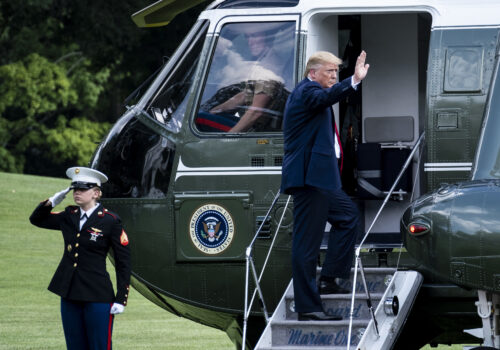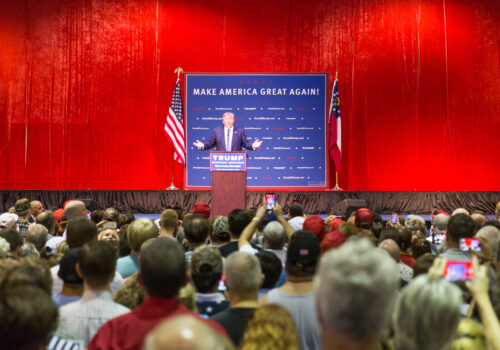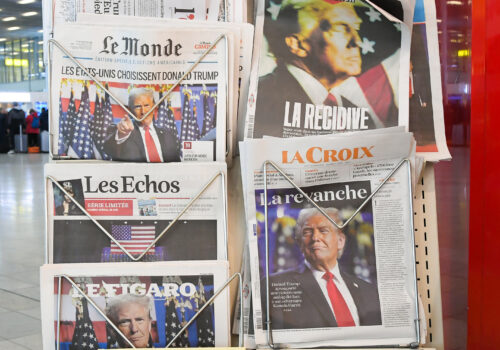Trump’s return is a test of European resolve and growth
Donald Trump has won the US presidency, and Europe must change. This realization hit European Union (EU) leaders shortly after the US elections as they met during the November 7-8 European Council summit in Budapest. Trump’s comeback persuaded them to find an unexpected agreement in their final declaration, pledging that Europe would “ensure its common economic prosperity, boost its competitiveness, become the first climate-neutral continent in the world and ensure the EU’s sovereignty, security, resilience, and global influence.”
This rhetoric reflects an urgent realization among European leaders: The EU must work out new strategies to safeguard its interests in an increasingly unpredictable global environment.
A new era in transatlantic relations
Early reactions to Trump’s victory offer insights into how the EU might proceed. French President Emmanuel Macron urged Europe to adopt a more assertive stance, stating that “Europe needs to grow some teeth or risk being eaten by the world’s carnivores. I think, at the very least, we should choose to become omnivores.” Meanwhile, German Chancellor Olaf Scholz took a more conciliatory tone, noting that Europe will continue to work well with the future US president while cautioning that “we must do what is necessary for our security.” Italian Prime Minister Giorgia Meloni seemed to embrace the new challenge. Echoing US President John F. Kennedy, she said, “Don’t ask what the US can do for you, ask what Europe should do for itself.”
Trump’s transactional approach to international relations raises concerns. His preference for bilateral agreements risks fracturing European unity as individual member states jockey for favor with the White House. While leaders ideologically aligned with Trump, such as Hungarian Prime Minister Viktor Orbán, may hope for closer ties, the EU should prioritize collective strategic interests over fragmented approaches.
Toward a common goal
The EU faces a critical test: Can it devise a unified strategy to respond to Trump? The president-elect is widely considered to be “unpredictable,” and many European partners are wary about Trump’s threats to raise tariffs. If these tariffs do go into effect, then the eurozone’s gross domestic product could shrink by an estimated 0.7 percent, with the German and Italian economies in particular at risk. This looming threat could induce European leaders to find solutions to this issue together. The risk is that, under pressure, Europe will divide and approach Washington in a disorganized way.
The EU can build up a new phase of prosperity by focusing on three pillars: economic competitiveness and industry (especially regarding the automotive sector), the energy transition, and defense. These are strategic points of the EU competitiveness report, released in September and written by Mario Draghi, the former Italian prime minister and European Central Bank president. Noting in Budapest that Europe is “too small” to go in a random direction, Draghi said: “We have to negotiate with the US ally, with a united spirit, in a way that also protects our European producers.” In the competitiveness report, Draghi presented a roadmap, and European leaders appear increasingly inclined to adopt it. As Draghi has explained several times, “Integration is our only hope.”
Ukraine at the forefront
The future of the EU and transatlantic relations cannot be separated from how the Russian aggression against Ukraine will end. US President Joe Biden succeeded in uniting Europe in defense of Kyiv after Russia’s full-scale invasion in February 2022. During his campaign, Trump presented himself as the president who would end various conflicts all over the world. According to his campaign promises, he has a plan to stop the Russian aggression in Ukraine. His recently announced appointment of General Keith Kellogg as special envoy to Ukraine and Russia is indicative of how things might unfold, with the US prioritizing a ceasefire. As part of a potential deal, this could involve the United States reducing its financial support to Kyiv, which would require European countries to shoulder more of the expense of supporting Ukraine’s defense.
Recent European initiatives highlight the challenges ahead. On November 16, Scholz spoke with Russian President Vladimir Putin for the first time since late 2022, perhaps testing the waters for a potential peace deal, which might bolster the chancellor’s weakened standing at home ahead of Germany’s upcoming February elections. The following day, Meloni, as chair of the Group of Seven (G7), issued a declaration of “unwavering support for Ukraine,” condemning Russia as “the sole obstacle to a just and lasting peace,” in a document also signed by Scholz.
While well-intentioned, these efforts appeared uncoordinated, evoking memories of Europe’s divisions during the Iraq War in 2003. In this sense, the EU risks reliving a “2003 moment.” Twenty-one years ago, the EU’s leaders were deeply divided over supporting the United States’ ultimatum that would trigger the Iraq War. On one side, France and Germany, led by French President Jacques Chirac and German Chancellor Gerhard Schröder, strongly opposed US President George W. Bush’s plan and were convinced that Europe needed to find its own strategic autonomy. On the other side, the leaders of United Kingdom, Italy, and Spain (among other nations) openly supported Bush.
To echo Draghi, Europe cannot afford such division again. The European Union—after nearly three years of support for Ukraine—must demonstrate unity in addressing the Ukraine conflict, recognizing that a fractured approach would undermine its credibility and strategic autonomy.
Charting a path forward
Major European countries—Germany, France, and Italy—must spearhead efforts to bolster EU integration and redefine transatlantic relations. Germany’s upcoming February elections could have a significant impact on the bloc’s politics. It could usher in a government more committed and ambitious about EU integration, potentially led by Friedrich Merz and the Christian Democrats in a coalition with the Social Democrats. Such a coalition would be politically aligned with the president of the European Commission, Ursula von der Leyen, strengthening Berlin’s role in shaping EU policy.
In February 2025, France’s Macron will host the Artificial Intelligence Action Summit in Paris, to which he will certainly invite Trump and the president-elect’s billionaire confidant Elon Musk. Although challenging, it could be the right occasion to assess the US president’s stance toward Europe. Macron’s prior interactions with Trump may prove valuable in navigating this complex relationship in the future.
Under Meloni, Italy could play an important role in fostering European unity through its G7 membership. By aligning with allies such as Japan and Canada, Rome also might be able to help temper Trump’s inclination toward bilateral relations at the expense of multilateral coordination. To preserve its influence, Rome will want to enhance the role of the G7, where it has a seat at the table, unlike in forums such as the Weimar Triangle—comprising France, Germany and Poland—where Italy participates only as a guest.
Europe faces a great challenge: Strengthening its integration while at the same time reshaping its ties with the United States. Success will require strategic foresight, unity, and the willingness to adapt to a multipolar world. Though the path will undoubtedly involve trials and errors, it is a challenge that European countries must face together.
Mario De Pizzo is a nonresident senior fellow at the Atlantic Council’s Europe Center.
Further reading
Wed, Nov 13, 2024
Trump is inheriting a more dangerous world
Inflection Points By Frederick Kempe
China, Russia, North Korea, and Iran are coordinating in unprecedented ways, posing new challenges to the incoming US president.
Fri, Nov 22, 2024
Sanctions expectations in a second Trump administration
Econographics By Daniel Tannebaum
Sanctions are poised to remain a cornerstone of US foreign policy under a second Trump administration. With a focus on Iran, Russia, and potentially China, Trump's team may lean on tools like secondary sanctions while navigating a tense geopolitical environment.
Fri, Nov 8, 2024
What the world thinks of Trump’s return to the US presidency
New Atlanticist By
From Ukraine to Australia, Sweden to Singapore, Atlantic Council experts examine how people in different countries view the decisive win by President-elect Donald Trump.
Image: US President-elect Donald Trump gestures as he meets with House Republicans on Capitol Hill in Washington, U.S., November 13, 2024. REUTERS/Brian Snyder/File Photo


